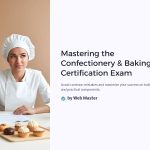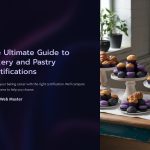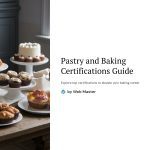 Embarking on the journey to obtain your Confectionery and Baking Certification is both exciting and challenging. However, common mistakes can hinder your progress. By understanding and avoiding these pitfalls, you can enhance your chances of success and achieve remarkable results in your baking endeavors.
Embarking on the journey to obtain your Confectionery and Baking Certification is both exciting and challenging. However, common mistakes can hinder your progress. By understanding and avoiding these pitfalls, you can enhance your chances of success and achieve remarkable results in your baking endeavors.

Understanding the Certification Exam Structure
Before diving into preparation, it’s crucial to comprehend the structure of the Confectionery and Baking Certification Exam. The exam typically consists of two main components:
- Written Exam: This section assesses your theoretical knowledge of baking principles, ingredients, and safety protocols.
- Practical Exam: Here, you’ll demonstrate your hands-on skills by preparing specific baked goods within a set timeframe.
Familiarizing yourself with the exam format ensures that you allocate appropriate time and resources to each section, minimizing unexpected challenges on exam day.

Common Mistakes in the Written Exam and How to Avoid Them
The written exam evaluates your understanding of baking theory, ingredient functions, and safety standards. Common mistakes include:
- Insufficient Study of Ingredient Functions: Not fully understanding how different ingredients interact can lead to incorrect answers. To avoid this, create detailed notes on each ingredient’s role in baking.
- Overlooking Food Safety Protocols: Questions about hygiene and safety are common. Ensure you study these protocols thoroughly to avoid simple mistakes.
- Poor Time Management: Spending too much time on difficult questions can leave you rushing through others. Practice with timed quizzes to improve your pacing.
By addressing these areas, you can enhance your performance on the written exam.

Navigating the Practical Exam: Pitfalls and Prevention
The practical exam is where your baking skills are put to the test. Common pitfalls include:
- Inadequate Preparation: Failing to practice all required recipes can lead to uncertainty during the exam. Ensure you have practiced each recipe multiple times.
- Improper Time Allocation: Mismanaging time can result in incomplete products. Develop a time plan for each baking task during practice sessions.
- Neglecting Presentation: The appearance of your baked goods is crucial. Pay attention to plating and garnishing during practice.
- Overlooking Equipment Familiarity: Not knowing how to operate specific equipment can cause delays. Familiarize yourself with all tools and machines you’ll use.
By focusing on these aspects, you can approach the practical exam with confidence.

Effective Study and Practice Strategies
To excel in both components of the exam, consider the following strategies:
- Structured Study Plan: Develop a study schedule that covers all topics systematically, ensuring comprehensive coverage.
- Hands-On Practice: Regularly practice baking the items listed in the exam syllabus to build muscle memory and confidence.
- Mock Exams: Simulate exam conditions by taking practice tests to identify areas needing improvement.
- Peer Review: Join study groups or workshops to gain feedback and share techniques with fellow candidates.
Implementing these strategies can significantly improve your preparedness.

Leveraging Resources and Support Systems
Utilizing available resources can enhance your preparation:
- Professional Courses: Enroll in baking courses that offer structured learning and expert guidance.
- Online Tutorials: Access online videos and tutorials for visual learning and technique demonstrations.
- Study Guides: Invest in reputable study materials that provide in-depth coverage of exam topics.
- Mentorship: Seek guidance from certified bakers who can share insights and tips.
By leveraging these resources, you can enrich your learning experience.

Maintaining Well-being During Preparation
Your physical and mental well-being play a vital role in your exam performance:
- Balanced Diet: Ensure you’re eating nutritious meals to maintain energy levels.
- Regular Exercise: Incorporate physical activity to reduce stress and improve focus.
- Adequate Rest: Prioritize sleep to aid memory retention and cognitive function.
- Mindfulness Practices: Engage in activities like meditation to enhance mental clarity.
Taking care of your well-being ensures you’re in optimal condition for both preparation and exam day.
Explore Official Certification Guidelines
Access Practice Exams and Study Materials
Join a Baking Workshop Near You
*Capturing unauthorized images is prohibited*




